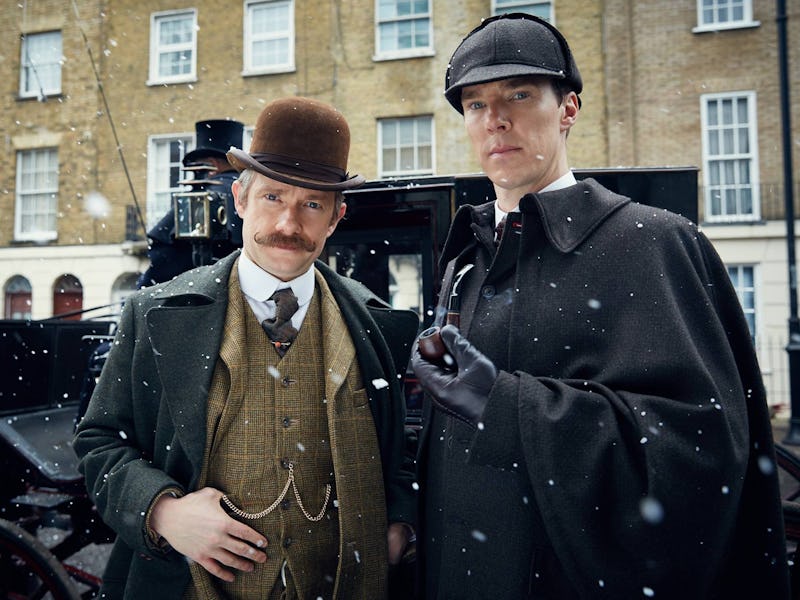Send Sherlock to the Future
The BBC 'Sherlock' special sends Sherlock and Watson to the Victorian Era. But what Steven Moffat should really do is gets these guys a TARDIS.

Everyone is justifiably jazzed about the upcoming BBC Sherlock’s Victorian special. The excitement is entirely understandable: Benedict Cumberbatch’s shrewd-eyed sociopathic Sherlock strolling around in a top hat; Martin Freeman’s Watson with an even larger mustache; Mycroft stepping out of a carriage, cane in hand (one presumes, though it’s not in the trailer). It’s good stuff, but it’s not inventive stuff.
Steven Moffat and the BBC are collectively missing an opportunity here: If you’re going to jump around in time, don’t send Holmes and Watson back to the Victorian era — send him to the future. This wouldn’t be without precedent in the Sherlock lore. If Moffatt wants a mind-palace to build off, he can simply look to David Dvorkin’s sci fi spin on the narrative in Time For Sherlock Holmes. Check out the novel’s official description:
Sherlock Holmes meets H. G. Wells, discovers the secret of immortality, hunts Professor Moriarty across time and space, and manipulates the destiny of mankind, all with the unflinching support of the stalwart Dr. Watson, who is coping meanwhile with finding and losing the love of his life.
One reviewer further elaborates, “Moriarty gets caught up in a timewarp when he tries to nuke the U.S. president’s visit to California and keeps knocking off world leaders so it’s up to Holmes to stop him.”
Yes.
Lest you think that sounds too off-the-wall, Moriarty scheming to knock off world leaders would meet with Sir Arthur Conan Doyle approval. In his Sherlock Holmes short story The Adventure of the Empty House, Doyle gives Moriarty a powerful German air gun disguised as a cane. Sir Arthur Conan Doyle writes of Moriarty:
“He is the Napoleon of crime, Watson. He is the organizer of half that is evil and of nearly all that is undetected in this great city, He is a genius, a philosopher, an abstract thinker. He has a brain of the first order. He sits motionless, like a spider in the center of its web, but that web has a thousand radiations, and he knows well every quiver of each of them. He does little himself. He only plans.”
That sounds exactly like a guy who would conspire to off world leaders just to watch the world burn. And Steven Moffat clearly ran with this portrayal in BBC’s Sherlock. Another reviewer said of Dvorkin’s work: “I found it very compelling to see how Holmes and Watson, even as their lives grew apart in certain ways, collaborated so successfully to fight Moriarty and offer the universe a future. Their partnership, their trust, felt very real and true to the Holmesian tradition.”
This reviewer illuminates at the heart of the matter: it’s not the time period that makes a story feel authentically Sherlock; the key is the friendship between Holmes and Watson and the rivalry between Holmes and Moriarty. Moffatt and his writers knew that — one of the most compelling episodes of Sherlock is “The Sign of Three”, which takes a deep dive into the odd-couple brotherhood between Watson and Holmes.
Because Sherlock’s original author, Sir Arthur Conan Doyle — himself a possessor of a daunting mustache — lived in the Victorian era, it makes sense why so many Sherlock adaptations are tempted to travel backwards through time. Guy Ritchie’s version of the character snarks and kicks ass around a steampunk Victorian London. Ian McKellen’s aging Mr. Holmes places the detective in the 1940’s. Basil Rathbone’s famous Sherlock incarnation investigates Nazis. These are all rich time periods for a master of deduction and his loyal, occasionally homoerotic sidekick.
But the future is just as rich a playground — perhaps even richer than the past, as it remains an unexplored land ripe with possibility. And since Steven Moffat has plenty of experience in matters of time-travel, he shouldn’t settle for being one of the crowd. Shove Sherlock Holmes in a TARDIS and send him whizzing off to parts unknown, accompanied by Watson, Moriarty, and Mycroft. Now that would be a showstopper of a Sherlock.